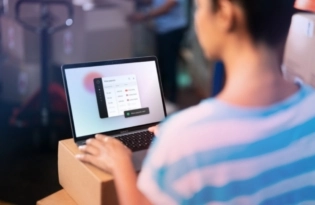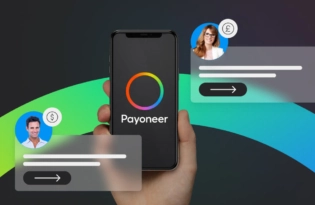HomeResourcesGlobal mass payouts and integrations for marketplaces Account Receivable
The uberization of B2B payments
Technology has transformed our world in numerous ways. As the world opens digitally, borders are no longer barriers. Commerce is evolving, and so should your payment platforms. That’s why we go beyond payments and offer tools for success. Learn about the infrastructure you need for B2B payments here.

Technology has fundamentally transformed the world we live and work in. Borders that have obstructed the way people and businesses communicate, interact, and transact are rapidly eroding. Across virtually all sectors, a newly formed metalayer now sits atop local systems, processes and environments, bringing together the entire business world in an unprecedented, integrated way and democratizing access to global markets for any business of any size anywhere in the world.
As a leader in digital global payments, we at Payoneer relentlessly focus on helping businesses of all sizes succeed in this new digital reality. We’ve build a digital, global, interconnected platform that makes paying and getting paid across borders as easy as sending and receiving local payments. We’ve opened the door to millions of global businesses, enabling them to grow their revenues exponentially by offering their goods and services to the entire world. We’ve paved the way for ecommerce and digital service marketplaces to expand globally, helping to further close the gap between geographies. We are continually humbled by how forces much larger than us have been instrumental in creating this wave of opportunity and transformation that has driven our success. Four major transformational changes in how the world is evolving have impacted the digital payments landscape, and us along with it.
Reduced friction in business interactions empowering faster, more accessible transactions
The barriers that used to stand in the way of people and businesses around the world are coming down. We’re seeing a massive reduction in the friction that traditionally hindered cross-border commerce, communication and transactions. A new digital, global infrastructure is increasingly creating more opportunities for everyone involved – buyers and sellers. In recent years, digital marketplaces and platforms have found that supporting global digital commerce with legacy global payments systems is no longer sustainable. We provide these businesses a single partner with a single platform that gives them access to expand their reach globally and pay out to the whole world. We serve as an instrumental partner in addressing their biggest cross-border complexities. Those who previously could only access potential customers from their home market and deal in their own currency can now access anyone from anywhere in the world. We’ve removed the cost and burden that before made global expansion unattainable for most businesses. At the same time, we’ve opened opportunities for local entrepreneurs in every corner of the world to access these marketplaces as well as bill their global clients directly.
A newly formed, interconnected metalayer uniting businesses globally
Historically, infrastructure powering commerce has been limited to a county’s physical borders. Cross-border trade was simply not open to all economies and small businesses. With the development of the internet, the whole business world is now essentially connected on the same digital infrastructure, irrespective of what lies beneath. Developed and developing nations can now connect, interact and transact, unfettered. We keep commerce on this level frictionless by providing payments that arrive as requested, on time, and at a fraction of a cost. Just because the world gets a lot smaller, it doesn’t mean we understand each other or operate in jurisdictions that are even remotely similar. Financial networks remain highly regulated and the knowledge and manpower required for global banking compliance is substantial and consequential. Our contribution has always been to provide a localized market knowledge and engagement, multi-lingual support, industry-leading compliance and risk management teams, and an unmatched financial network – over a decade in the making – with multi-layer banking redundancy covering the entire world. The world has found a way to unite businesses globally and we’ve built a better way for them to buy and sell from one another.
An ever-shrinking gap between market and talent
We’re seeing the developed world and developing worlds come closer together every day and the gap between talent and market is disappearing almost entirely. Today, participation in the global economy is not limited to where you are in the world and doesn’t depend on how large your business is – you can be a sole proprietor, entrepreneur, or small business owner anywhere on the planet and you now have access to a wealth of new opportunities to build and grow a global, digital business. If you have something of value to offer the world – content, a service, an idea, a tangible good – whatever it is, there’s an entire world of opportunity that’s now accessible. This explosion of new opportunity has been transformational and in turn, we’re democratizing access to global payments the way technology is democratizing access to commerce. Just a decade ago, opening a cross-border business involved a substantial undertaking. Now, we provide any sized business access to all the tools they need to stay in their home market and invite customers across the globe to make payments as if they were paying a local business.
The emergence of digital intermediaries redrafting the landscape of global commerce
Much of this new opportunity is in part due to the appearance of natively digital platforms and marketplaces redrawing the global supply chain. How buyers and sellers connect in the digital economy is reshaping the future of commerce. It’s reshaping opportunities for businesses of all sizes, across the world and enabling more participants to grow and expand their businesses in a global economy. The businesses powering these platforms aren’t making things that are being bought – they’re creating a space for commerce where one did not previously exist. Players in this new global economy need basic access to the flow of funds, and the tools and guidance to grow their businesses. This is where we come in. We go beyond payments by offering data, compliance and risk management solutions, a tax management platform, working capital funding, instant access to partners that provide logistics, marketing, advisory services, and a range of other tools for success.
Payments are merely a piece of a world that is rapidly uberizing. Payments need to change at the rate that commerce is evolving. Creating the infrastructure is only the first step to contributing to the global economy. Providing the opportunity without the necessary tools for success is not enough – offering the flow of payments doesn’t constitute uberization. In the world of commerce, it means going beyond to ensure that buyers and sellers are not only closer, able to find each other and transact, but also to thrive.
Related resources
Latest articles
-
Made in India for the World: The State of Indian Cross-Border eCommerce
The Indian eCommerce market has grown significantly in the last few years. As a result, many cross-border businesses have undergone a fast-paced digital transformation and contributed to surpassing the government-set $400 billion target of trade within a single year.
-
Defying the odds: How Ukrainian businesses thrive during war
One year post-war, Ukraine’s businesses adapt and thrive amidst adversity. Entrepreneurs showcase resilience, reflecting national tenacity. Many diversify, venturing into e-commerce and digital realms. Despite hurdles, 44% of SMBs aim for growth, with 36% hiring. Their grit underscores Ukraine’s enduring spirit amid challenges.
-
What Are The Best Payment Options For Freelancers?
Freelancers offer flexibility and expertise without the overhead of traditional employees. However, processing invoices and payments for international freelancers can be a complex and time-consuming process. To work with freelancers effectively, it’s crucial to understand the available payment options for freelancers and how to best keep on top of accounting and invoicing.
-
An 8-point Checklist for Finding the Best Payment Provider
There’s huge potential to expand into ASEAN markets. But only for online sellers that accept local payment methods. Finding a trusted payment solution can be a worry and a challenge. Use this checklist to vet potential payment partners. With the right payment support, the sky’s the limit!
-
How to bill your international clients
Want to learn how to bill international clients when you’re based in the Philippines? In this article we spoke to three leading business owners who shared their tips to working successful international work. Learn how they collect payments and more below.
-
How to nail your direct-to-consumer payment strategy
Asia-Pacific offers massive potential for DTC ecommerce. But cross-border payments can be a headache. We share an actionable strategy for DTC payments that’ll remove DTC payment hazards and expand your business with ease. What are you waiting for?












